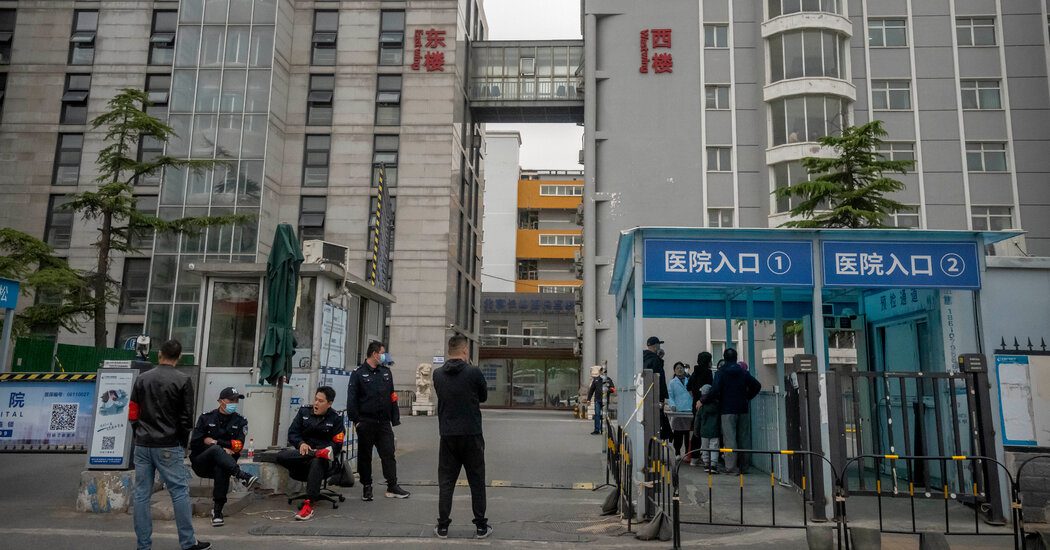Global Courant 2023-05-08 12:00:12
BEIJING — The hospital in southern Beijing advertised itself as specializing in vascular tumours, particularly benign moles that are common in babies.
But when a fire broke out there last month, killing at least 29 people, many of the victims were there for a different reason: They were elderly people with disabilities receiving nursing care, some of whom had been there for months or even years. stayed in the private hospital. , although it was not licensed as a provider of long-term care for the elderly.
The tragedy at Changfeng Hospital – the deadliest fire in China’s capital in more than two decades – has reexamined a long-running problem. China’s population is aging rapidly, with 400 million people, nearly 30 percent of the population, expected to be over 60 by 2040. But medical resources have not kept pace; at the end of 2020 there were only about eight million nursing or elderly beds, according to official statistics.
Authorities have recognized the urgency to address the shortfall, with Beijing’s latest five-year plan pledge to increase that number to nine million beds by 2025. But there are still many obstacles.
Social stigmas against retirement or nursing homes are still prevalent in a culture that emphasizes children’s duty of care to their parents. Even for people looking to embrace healthcare facilities, public facilities often have long waiting lists, and private facilities — not covered by public health insurance — can be prohibitively expensive.
Then there’s the problem of getting facilities properly licensed to provide nursing care in the first place, a process complicated by bureaucratic requirements and a lack of trained staff, experts said. As a result, some private companies seeking to meet the demand for senior care operate underground.
Local officials are now investigating whether Changfeng Hospital illegally provided long-term care for the elderly reports in the state media. Some people who escaped the blaze told Chinese media that the limited mobility of some patients may have contributed to the death toll.
There is no clear connection between the possibly unauthorized care and the fire; deadly fires have also broken out in licensed nursing homes. But the fire has drawn the public’s attention to the underground market and the reasons for its existence.
Some victims’ relatives and public health experts have urged authorities to look beyond punishment and to bring the providers out of the shadows.
“This is just the tip of the iceberg,” the spokesman said Sabrina Luk Ching Yuen, a professor at Nanyang Technological University in Singapore who studies aging, adding that there were likely many similar cases of underground concern. “If the market is there, what is the government trying to do?”
Attempts by The New York Times to directly reach the victims or their relatives were unsuccessful. Changfeng Hospital has been closed to visitors since the fire, and when Times reporters tried to interview victims or their relatives at other hospitals where the injured had been transferred, they were blocked or escorted out by hospital staff.
Authorities, as usual after disasters in China, have tried to contain the story and prevent reporters from speaking to victims. They just said that the patients who died ranged from 40 to 88 years old, with an average age of 71, and that most of the 21 seriously injured patients had chronic illnesses.
But some Chinese news outlets managed to interview relatives of patients at Changfeng Hospital, who described an elderly father who had been there since last summer due to disability after a cerebral hemorrhage, and another male, 76, who had no motor skills and lived there full time.
Reportedly the relatives said they were drawn to the hospital for its ability to provide medical care to their loved ones with disabilities. In contrast, nursing homes in China have traditionally provided little to no medical care.
The bereaved also appreciated that bed turnover was less of an issue in private hospitals, which, while significantly more expensive than public ones, were less crowded. According to one report, a woman said her father was forced to commute between different institutions before finding Changfeng Hospital.
That woman said she paid about $870 a month in nursing expenses for her father. Some online advertisements for a nursing home at the same address as Changfeng Hospital listed fees as high as $1,400 per month. The average monthly pension in Beijing was 4,157 yuan, or about $600, in 2019.
Private hospitals have many incentives to try and capitalize on the unmet demand for long-term medical care Bei Wu, a Professor of Global Health at New York University who has studied aging in China. Even before the coronavirus pandemic, many struggled to attract enough patients to make money because of their higher price tags.
Then, under China’s three years of strict Covid restrictions, people who could avoid hospitals did. Out-of-town patients, who often traveled to major cities like Beijing for care, dwindled as the country tried to restrict traffic.
Changfeng Hospital’s publicly traded parent company lost more than $14 million between 2020 and the first half of 2022, according to public documents. It did not respond to multiple requests for comment.
“I see some ways that this has prompted private hospitals to say, ‘Hey, we can provide care for these older adults with disabilities because it can be a potential source of income,'” said Dr. Wu.
Indeed, the government has promoted the integration of medical and elderly care, encouraging nursing homes to build medical facilities and hospitals to provide more nursing services.
But China, like many other countries, has a dire shortage of staff trained to specifically care for elderly patients. And the government departments overseeing medical care and nursing care have been separated, further delaying the approval process, said Professor Luk in Singapore.
“The intention is good,” she says of the integration plan. “But in reality it’s really hard to implement.”
She said she hoped one of the results of the Beijing fire would be a call to action for the government: either it should provide more long-term care facilities itself or make it easier for private companies to do so.
In fact, the need will only increase. According to official statistics, the number of elderly Chinese with disabilities is expected to more than double this decade to reach 100 million by 2030.
The facilities are especially important to the lucky few who have found a place for their relatives there. Hua Ailing, a post office accountant in a small county in Anhui province, chose to send her 89-year-old mother to a private hospital with a long-term care permit last year after her mother was unable to walk. She said she felt more comfortable sending her there than a traditional nursing home, where medical care could be unreliable.
If the option hadn’t existed, she and her siblings wouldn’t have known what to do. “After a while, we couldn’t take care of her ourselves,” said Ms. Hua. “We’re all in our sixties, after all.”
Joy Dong reported from Hong Kong. Li You contributed to research.




